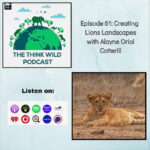
Listed as “Vulnerable” by the IUCN Red List, The African Lion is one of the most threatened species in the world. The population of this regal carnivore has dropped drastically from over 200,000 individuals a century ago to approximately 24,000 today. Almost half of this population is found outside protected areas, often in human-dominated landscapes. Rampant habitat loss and fragmentation, coupled with a sharp decline in prey abundance across their range is a recipe for human-wildlife conflict. Lions are often persecuted in retaliation to livestock degradation by these big cats. This has unfortunate consequences for Africa’s vultures which often prey on livestock carcasses poisoned by farmers, intending to murder problematic lions.
Additionally, lions are increasingly falling victim to the illegal wildlife trade to meet the demand for wildlife products in China and Vietnam, following the clamp down on tiger poaching in Asia. More specifically in southern Africa, lions are often captured for the horrific canned lion industry.
In this episode, I interview Alayne Oriol Cotterill, the CEO of Lion Landscapes, which is one of the leading organizations working towards lion conservation. We cover their various projects, such as their Ruaha Carnivore Program, Community Co-Op, and Collaring for Coexistence programs. We also talk about the “controversial” role of trophy hunting in wildlife conservation in Africa.
If you enjoyed this podcast, do not forget to share and subscribe! You can also listen to The Think Wildlife Podcast on other platforms, such as YouTube, Spotify, and iTunes.
Get full access to The Think Wildlife Podcast at anishbanerjee.substack.com/subscribe
